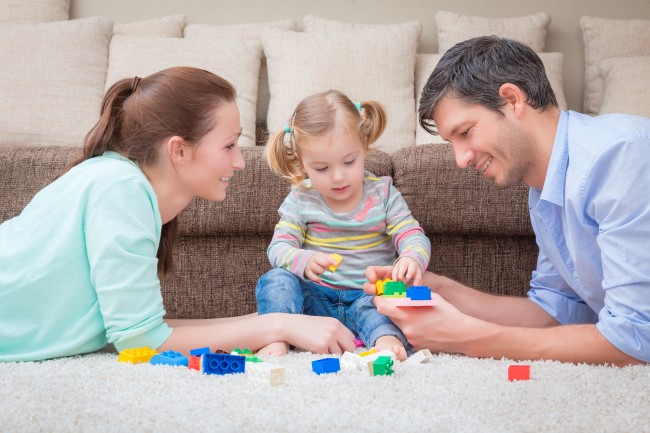Toddlers thrive on routine, so having the identical bedtime routine every night will soon become a trigger to him to start shutting down to a calmer state.
Try and keep this time of the day calm and quiet, so if Dad is home, try and limit the amount of horseplay and excitement that takes place – rather stick to calming, nurturing activities such as watering the garden, doing a puzzle, or play “I spy”. Avoid intensive movement activities and rough house play at this time, but encourage them in the afternoon.
Try and serve supper at roughly the same time each evening, and perform the same activities thereafter until bedtime
Follow these tips
- Tidy up – teach him to put his own dishes in the sink or dishwasher.
- Lay out his pajamas and toiletries on the bed – let him help you.
- Run a bath – let him help you (note: never leave him alone in the bathroom).
- Give him a warm, calming bath, or bath with him – add a drop of lavender or chamomile oil – a few stack toys are ideal for bath time – this is also a nice time for Dad to get involved.
- Wrap him tightly in a warmed towel when you are finished, and dry him with deep, firm strokes. Deep pressure activities such as this are most useful to help him calm down. Have a favourite song that you always sing at this time (such as “this is the way we dry ourselves….”).
- A massage (if he will let you) is a wonderful way to end off bathtime. Deep pressure touch, is for most of us, one of the most effective ways to calm when we are feeling overloaded. Massage enhances parent-child bonding, helps the child to calm to the quiet alert state, and so promotes deeper sleep. Contact the International Association of Infant Massage South Africa: 011 – 787-0681011 – 787-0681 for details of an instructor in your area.
- Have some calming, lullaby music playing softly in the background.
- If there is time before bedtime, keep all stimulation to a minimum, play quiet games such as puzzles and stacking games, and read stories (no dragon stories!) – try to remain within the ‘sleep zone’.
- Offer the last drink of the day (if appropriate).
- Last trip to the bathroom to brush teeth and wash hands, a nappy change or, if age appropriate, a loo stop! –
- Help him to choose a book for his bedtime story (if age appropriate).
- A cuddle and kiss, and into bed – no story unless he gets into bed and under the covers!
- Read a bedtime story that is age appropriate, and not too scary – stick to old favourites (toddlers love the same book over and over again). A good tip is to make up an ending that entails the hero/heroine also going to sleep! Try not to get hooked into more than one story.
- Last kiss and cuddle, and a firm and loving “goodnight”. Leave when your child is still ‘happily awake’, not drowsy or asleep. (you’ll only create an expectation to always stay with him, which may become a behavioural issue later). You may have to close the door if he keeps coming out of the room. Leave a night light on so that he is not left in the dark.
- Expect some tears (and the odd tantrum) – pop in and out the room to give cuddles and reassurance but remain consistent with your boundary – it is sleep time!
Ann Richardson
Latest posts by Ann Richardson (see all)
- How to prepare your toddler for a sibling - June 9, 2014
- Your toddler and the new baby – 12 tips - June 6, 2014
- Toddler Nutrition: Healthy lunchbox ideas - June 5, 2014






 Saving...
Saving...